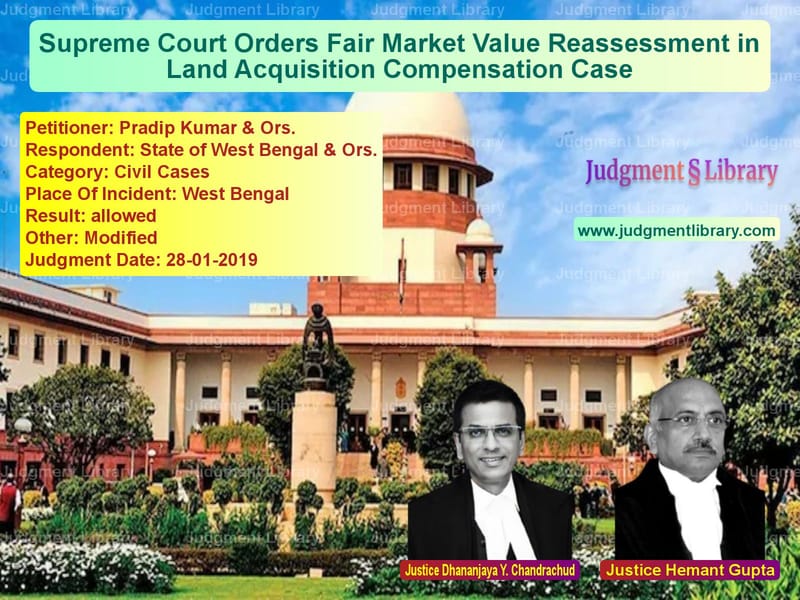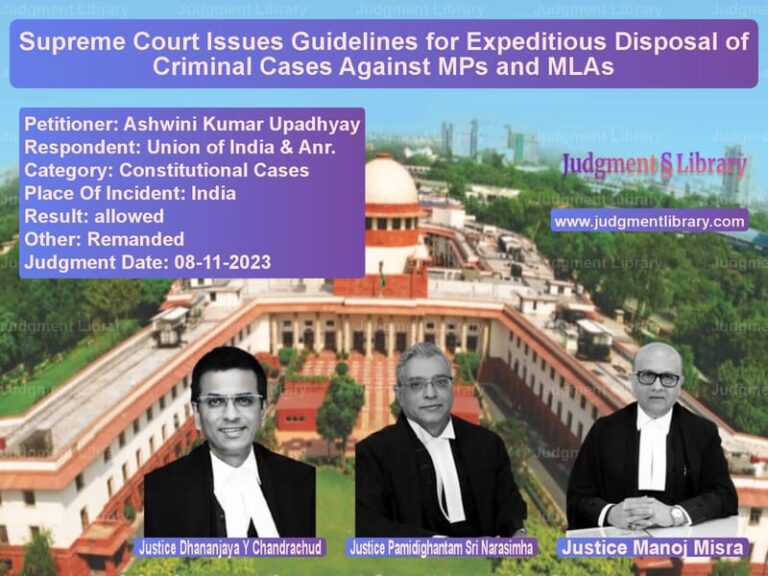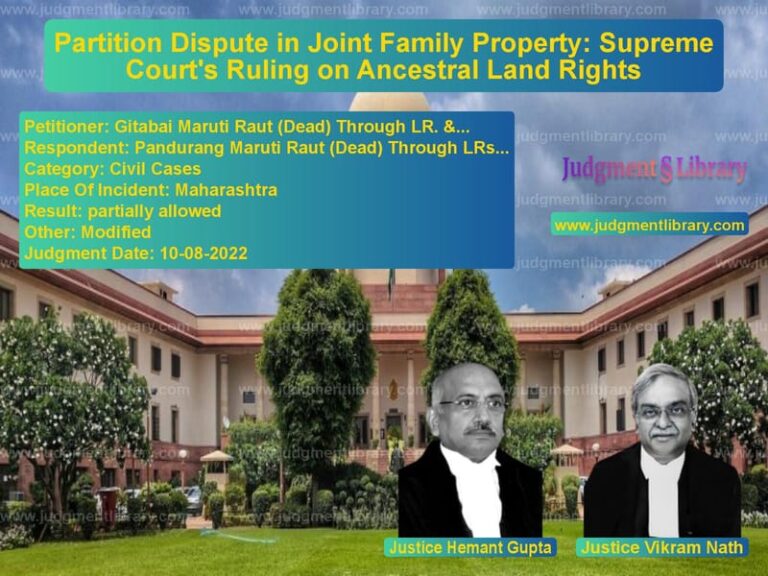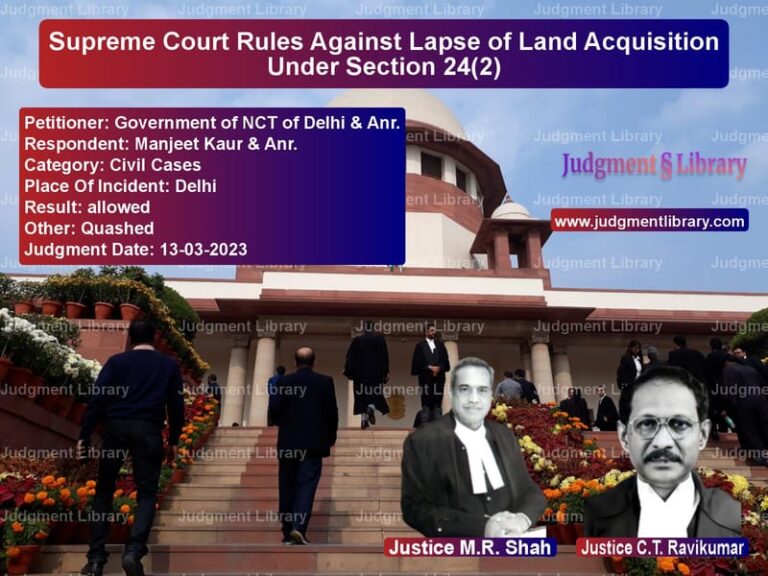Supreme Court Orders Fair Market Value Reassessment in Land Acquisition Compensation Case
The Supreme Court of India recently ruled in Pradip Kumar & Ors. vs. State of West Bengal & Ors., addressing the rights of landowners whose lands were acquired under the Land Acquisition Act, 1894. The Court held that compensation must be determined based on the actual market value of the land at the time of acquisition and directed a reassessment to ensure fairness.
The judgment has far-reaching implications for land acquisition disputes, ensuring that affected landowners receive compensation that reflects the market realities rather than arbitrary government valuations.
Background of the Case
The case originated from a notification issued under Section 4 of the Land Acquisition Act, 1894, for acquiring land in West Bengal. The landowners, dissatisfied with the compensation awarded, challenged the assessment, arguing that the compensation failed to reflect the prevailing market rates.
The Land Acquisition Collector determined the compensation based on official rates, ignoring comparable market transactions that suggested significantly higher land values. The affected landowners first approached the Calcutta High Court, which enhanced the compensation partially but did not fully account for market trends. Dissatisfied, they moved the Supreme Court to seek a fair valuation.
Key Legal Issues
- Whether the compensation awarded under the Land Acquisition Act, 1894, was sufficient to reflect the market value of the land.
- Whether the High Court erred in failing to fully account for comparable sale instances submitted by the landowners.
- Whether additional components such as solatium and interest should be adjusted in light of the revised compensation.
- The role of the State Government in ensuring fairness in land acquisition compensation.
Arguments by the Petitioners (Landowners)
- The compensation was based on outdated rates that did not reflect the land’s true value.
- Comparable sales data from the same area showed substantially higher prices, which the authorities failed to consider.
- The High Court, while enhancing compensation, did not adequately account for inflation and rising land prices.
- The principle of eminent domain must be exercised with fairness, ensuring just compensation.
Arguments by the Respondents (State of West Bengal)
- The compensation was calculated based on prescribed methodologies under the Land Acquisition Act, 1894.
- The State followed the statutory process and awarded compensation as per existing records.
- Enhancing compensation based on comparable sale instances would lead to speculative claims and disrupt the acquisition process.
- Government rates were based on standard procedures and could not be easily revised.
Supreme Court’s Observations
The Supreme Court, comprising Justice Dhananjaya Y. Chandrachud and Justice Hemant Gupta, ruled in favor of the landowners, emphasizing that the principle of fair market value is essential in determining compensation.
The Court held:
- “Fair compensation is an integral part of the right to property under Article 300A of the Constitution.”
- “The Land Acquisition Collector failed to consider real-time market data, resulting in gross underestimation of the land’s value.”
- “Market value must be assessed based on comparable transactions and not merely government-fixed rates.”
The Court further ruled:
- “Ignoring recent market transactions in the same locality violates the principles of fair compensation.”
- “When landowners provide evidence of higher land values through legitimate sale transactions, the burden shifts to the government to justify its valuation.”
- “The solatium (additional compensation) and interest must be revised accordingly.”
Final Verdict
The Supreme Court directed:
- The compensation be reassessed to reflect the actual market value at the time of acquisition.
- The landowners be paid an enhanced solatium at 30% of the revised compensation.
- Interest on the enhanced compensation be recalculated from the date of possession.
- The State Government must ensure that all future land acquisitions follow the principle of fair market valuation.
Legal and Social Implications
- The ruling strengthens landowners’ rights and ensures they receive just compensation for their land.
- It mandates that land acquisition compensation must reflect real market conditions.
- The decision discourages arbitrary government compensation assessments and ensures accountability in land acquisition.
- The judgment sets a precedent for all future land acquisition disputes, reinforcing the principle of fair market value.
This case highlights the Supreme Court’s commitment to protecting landowners’ rights while ensuring that government land acquisition processes adhere to the principles of equity and fairness.
Petitioner Name: Pradip Kumar & Ors..Respondent Name: State of West Bengal & Ors..Judgment By: Justice Dhananjaya Y. Chandrachud, Justice Hemant Gupta.Place Of Incident: West Bengal.Judgment Date: 28-01-2019.
Don’t miss out on the full details! Download the complete judgment in PDF format below and gain valuable insights instantly!
Download Judgment: Pradip Kumar & Ors. vs State of West Bengal Supreme Court of India Judgment Dated 28-01-2019.pdf
See all petitions in Property Disputes
See all petitions in Damages and Compensation
See all petitions in Judgment by Dhananjaya Y Chandrachud
See all petitions in Judgment by Hemant Gupta
See all petitions in allowed
See all petitions in Modified
See all petitions in supreme court of India judgments January 2019
See all petitions in 2019 judgments
See all posts in Civil Cases Category
See all allowed petitions in Civil Cases Category
See all Dismissed petitions in Civil Cases Category
See all partially allowed petitions in Civil Cases Category







